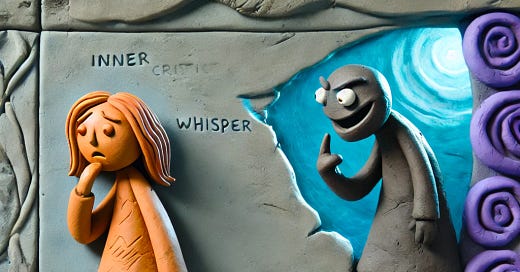All my life, or at least for as long as I can remember, my inner critic has walked alongside or maybe even led me along. That persistent voice questions my decisions, highlights flaws, and whispers doubts just when I need confidence most. This voice is so familiar that I sometimes mistake it for my authentic voice. Or is it?
The Universal Experience of Self-Judgment
We all have an inner critic. That voice that tells us we're not good enough, smart enough, or deserving enough. It's the voice that keeps us awake at night, replaying embarrassing moments or perceived failures. It's the voice that compares our worst moments to others' highlight reels and finds us lacking.
But where does this voice come from? Is it genetic, passed down through generations as a survival instinct? Is it environmental, shaped by our earliest experiences and relationships? Is it more pronounced in some than others, perhaps those of us with heightened sensitivity or perfectionist tendencies?
Nature, Nurture, and Everything Between
Research in developmental psychology suggests that our inner critic forms through a complex interplay of factors. While some personality traits that may predispose us to self-criticism (like neuroticism or sensitivity) have genetic components, the specific content and tone of our inner critic is largely learned.
Family dynamics play a crucial role. Children internalize the voices of caregivers—not just what they explicitly say, but how they react to failure, how they speak about themselves, and what they implicitly value. A parent who is harsh with themselves likely models self-criticism for their children. A household where mistakes are treated as catastrophes rather than learning opportunities teaches children to fear imperfection.
As I reflect on my inner critic, I hear echoes of my mother's voice. Not because she intentionally planted seeds of doubt, but because she also carried her inner critic, shaped by her parents, her experiences, and the cultural expectations placed upon women of her generation.
What we often forget is that our parents are flawed, just like we are. Their flaws are inherited from their parents, relatives, and other humans in their lives. They bring all of that to us. They don't shed it through some form of enlightenment the minute they become parents. But we hold it against them as if they should turn off everything from before we came into being.
So, I am not here to blame my mother or father for my critic. I don't blame them, but I want to understand where my critic comes from, what I own and what I inherited, and most of all, what I can let go of.
Protection or Sabotage?
I have often attached harmful intentions to my inner critic. That part of me wants me to stay mediocre, not achieve all I can. Why? I don't deserve it. I haven't earned it. I won't treat it with respect.
But what if we're misunderstanding the fundamental purpose of self-criticism? What if our inner critic is actually trying to help us?
From an evolutionary perspective, social acceptance was once a matter of life and death. To be rejected from the tribe meant facing the wilderness alone, almost certain death. Our inner critic may have developed as an early warning system to help us avoid behaviors that might lead to rejection or danger.
In other words, your inner critic is trying to protect you:
From the pain of failure
From the risks of standing out
From the vulnerability of trying
From the disappointment of hoping
The critic wants to keep you safe, but safety doesn't equal growth, fulfillment, or authenticity.
Critic as Protector
What if our inner critic is actually our friend? What if we looked at her as a protector, not a nagging adversary? Would that change how we deal with her comments?
It does for me. When I remember to think of her this way, I can sit more quietly with the feedback, thank her for caring, and then decide what I want to do.
This reframing doesn't silence the critic, but it changes the dynamic. Instead of battling against this part of yourself, you can approach it with curiosity and compassion:
"I hear that you're worried about me submitting this article. You think people might judge it harshly. Thank you for trying to protect me from that potential pain. I appreciate your concern, but I'm willing to take that risk because sharing my writing matters to me."
Society's Reinforcement
I must add that society encourages the inner critic, the idea that if you are not self-critical, you must not truly care about doing your best. And there is that whole thing about always striving to be a better version of yourself, that "I'm not good enough" cycle that never ends.
Again, if I don't keep focusing on being a better version of myself, I must not care about being the best I can be. Really?
Our culture profits from our insecurities. From beauty products to productivity apps to self-help books. An enormous industry is built on "you are not enough as you are." Social media amplifies this message, presenting carefully curated versions of lives that seem effortlessly perfect.
Even well-intentioned concepts like "growth mindset" and "continuous improvement" can feed the inner critic when misapplied. There's a vital difference between authentic growth motivated by curiosity and love versus frantic self-improvement driven by fear and shame.
Inner Critic vs. Intuition
And how does our inner critic jive with our intuition? How do we tell the difference? How do we embrace the right messages and filter out those that don’t serve us?
Here are some ways to distinguish between your inner critic and your intuition:
Inner Critic:
Speaks in absolutes and extremes ("You always mess this up")
Uses shame-based language ("You're so stupid")
Creates urgency and anxiety ("Everyone will think you're a fraud")
Focuses on others' judgments ("What will they think?")
Dwells on the past or catastrophizes about the future
Intuition:
Offers calm, clear guidance
Speaks from a place of self-care, not self-punishment
Provides insights without emotional charge
Often manifests as a "knowing" rather than a narrative
Is present-focused and solution-oriented
Learning to distinguish these voices takes practice and presence. Mindfulness meditation can help create the space between stimulus and response where this discernment happens.
From Self-Criticism to Self-Compassion
The path forward isn't about silencing the inner critic entirely. That voice developed for a reason and may sometimes offer a valuable perspective. Instead, it's about:
Recognition: Learning to identify when the critic is speaking
Investigation: Understanding what fears are driving the criticism
Compassion: Responding to those fears with kindness, not combat
Perspective: Questioning the critic's absolutist thinking
Choice: Deciding whether to follow the critic's advice or choose differently
Research by Dr. Kristin Neff and others has shown that self-compassion—treating yourself with the same kindness you would offer a good friend—leads to greater emotional resilience, less anxiety and depression, and healthier relationships than self-criticism does.
Self-compassion isn't self-indulgence. Studies show that self-compassionate people are more likely to take responsibility for their mistakes and are more motivated to improve themselves, but from a place of care rather than criticism.
Living Beyond the Critic
The ultimate goal of working with the inner critic is to be fully authentic and to reach my full potential in a way my parents may never have had the chance to do.
Imagine living from a place where self-awareness doesn't collapse into self-attack. Where you can acknowledge mistakes without shame. Where you can try new things without the paralysis of perfectionism. Where your worth isn't tied to achievement but is inherent in your being.
This is the promise of befriending your inner critic—not silencing it, but transforming it from adversary to ally on your journey toward fearless authenticity.
What voices have you internalized that no longer serve you? What would become possible if you could hear them with compassion rather than combat? How might your life change if you could thank your inner critic for its concern, then choose your own path forward?
The journey of self-compassion isn't always easy, but it is always worthwhile. And you don't have to walk it alone.
A Deep Dive
To begin transforming your relationship with your inner critic, try this journaling exercise:
Create space: Find 20-30 minutes of uninterrupted time in a comfortable setting
Connect within: Take a few deep breaths to center yourself
Identify a trigger: Think of a recent situation where your inner critic was particularly loud
Start the dialogue: Write out what your inner critic says, word for word
Get curious: Ask your critic questions like:
What are you afraid would happen if you didn't criticize me?
When did you first start protecting me this way?
What do you need to feel safe?
Respond with compassion: Write a response from your compassionate self to your critic
Find integration: Ask what wisdom the critic might have that you can use constructively
Close with gratitude: Thank your critic for its protective intention, even if its methods need updating
This dialogue isn't about eliminating the critic but transforming the relationship. With practice, you may find your critic softens, becoming less of a harsh judge and more of a caring advisor.
Daily Mantra
Carry this mantra with you throughout the week, especially when facing challenges:
"I honor my inner critic's protective intentions while choosing to move forward with compassionate courage."
Repeat each morning or whenever you feel external pressure to conform to someone else's work style. Keep it visible as a gentle reminder of your commitment to authenticity.
What resonated with you in this exploration of the inner critic? What techniques have helped you transform your relationship with self-judgment? Share your thoughts in the comments below.
As you continue to navigate social expectations and personal choices, remember that your path is uniquely yours. Embrace the journey, celebrate your accomplishments, and surround yourself with people who support and uplift you. Join me each Sunday at 10:10 a.m. ET for inspiration, encouragement, and community. Why 1010? In numerology, 1010 symbolizes new beginnings, spiritual awakening, and the realization of our potential.









I love your articles! They speak to me at exactly where I am right now. Thank you! I’m so glad I found your substack! 🥳